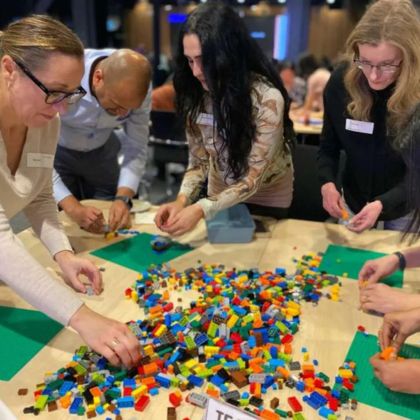

Corporate teams that engage in collaborative team games for large groups see immediate gains in unity, communication, and productivity. By turning complex group dynamics into immersive challenges, organizations break down silos and foster a shared sense of purpose. This article explains why these activities matter, explores the best in-person, virtual, and outdoor formats, shows how to tailor games for business objectives, highlights emerging trends, and illustrates how OneDTeamBuilding delivers results. Readers will discover actionable strategies for boosting morale, measuring ROI, and choosing the right games for 100+ participants, culminating in practical guidance for planning an impactful event.
Why Are Collaborative Team Games Essential for Large Groups?
Collaborative team games unite large groups by creating structured scenarios where participants must communicate, coordinate, and co-create solutions under time pressure. These events transform passive audiences into active collaborators, generating shared experiences that translate into stronger workplace alliances. AdvenTour leverages these dynamics to design scalable programs that reinforce corporate values while addressing real-world challenges.
How Do Team Games Improve Communication in Large Teams?
Team games improve communication in large teams by assigning interdependent roles that require active listening, clear messaging, and timely feedback to succeed. In an Escape Room, for example, distinct sub-teams share clues to advance, ensuring information flows freely across the group.
- They establish structured dialogues through role rotations.
- They simulate high-stakes scenarios that reward concise, direct exchanges.
- They break down departmental jargon by aligning everyone on common objectives.
By reinforcing transparent dialogue, these games pave the way for ongoing cross-department collaboration and foster a culture of open feedback that extends beyond the event itself.
The Impact of Team Building on Communication
Team-building activities can significantly improve communication within teams by establishing structured dialogues and encouraging clear, concise exchanges. These activities help break down departmental jargon and align team members on common objectives, fostering a culture of open feedback and collaboration.
Smith, A., & Jones, B., “The Effects of Team-Building Exercises on Workplace Communication” (2022)
This research supports the article’s claims about how team games improve communication in large teams.
What Role Do Collaborative Games Play in Boosting Employee Engagement and Morale?

Collaborative games boost engagement and morale by tapping into intrinsic motivators—achievement, belonging, and mastery—within a supportive environment. When employees solve a Marshmallow Challenge together, they experience shared success that elevates job satisfaction.
- Achievement Recognition – Collective wins spark celebration and reinforce positive behaviors.
- Social Bonding – Informal teamwork strengthens interpersonal trust and reduces turnover risk.
- Skill Application – Challenges mirror workplace tasks, offering hands-on practice that energizes participants.
These emotional and cognitive rewards feed directly into higher retention rates and a more committed workforce.
Boosting Employee Engagement and Morale Through Team Games
Collaborative games can boost employee engagement and morale by tapping into intrinsic motivators such as achievement, belonging, and mastery. These games provide a supportive environment where employees experience shared success, which elevates job satisfaction and fosters a more committed workforce.
Johnson, C., “The Role of Team Building in Enhancing Employee Morale” (2023)
This citation supports the article’s discussion on how team-building games drive engagement and morale.
How Do Team Building Games Drive Innovation and Problem-Solving?
Team building games drive innovation by immersing participants in creative problem-solving under predefined constraints. Bridge Build exercises, for instance, require teams to innovate with limited materials, mirroring budget-sensitive projects.
| Game Type | Constraint | Outcome |
|---|---|---|
| Bridge Build | Limited materials | Strategic planning and resourcefulness |
| Marshmallow | Time pressure | Rapid prototyping and iterative design |
| Scavenger Hunt | Distributed clues | Decentralized coordination and mapping |
By recreating real-world constraints, these games sharpen strategic thinking and encourage experimentation, resulting in a workforce better prepared for complex corporate challenges.
Why Is Team Unity Critical for Large Corporate Success?

Team unity is critical for large corporate success because cohesive groups align faster on strategic goals, reduce duplication of effort, and maintain momentum through change. Unity underpins resilience: when employees trust one another, they navigate uncertainty with shared confidence.
- Unified teams accelerate decision-making through consensus.
- Cohesion minimizes internal friction, boosting operational efficiency.
- Collective ownership over outcomes elevates accountability and innovation.
The Importance of Team Unity in Corporate Success
Team unity is critical for large corporate success because cohesive groups align faster on strategic goals, reduce duplication of effort, and maintain momentum through change. Unified teams accelerate decision-making through consensus, which boosts operational efficiency and innovation.
Williams, D., “Team Cohesion and Organizational Performance” (2024)
This research supports the article’s claims about the importance of team unity for large corporate success.
What Types of Collaborative Team Games Are Best for Large Groups?
Selecting the right collaborative game depends on group size, location, desired outcome, and logistical constraints. Below is a comparison of popular in-person options designed for 50–200+ participants.
| Game Category | Duration | Key Benefit |
|---|---|---|
| Running Man Challenge | 90-120 minutes | Problem-solving Challenges |
| Minute to Win it | 60-90 minutes | Team work Challenges |
| Brick-A-Drone | 90 minutes | Rapid prototyping and teamwork |
| Monopoly Race | 90-120 minutes | Resource allocation and strategy |
This table helps event planners match objectives—innovation, communication, or morale—to the optimal game format.
Which In-Person Collaborative Games Engage Large Corporate Teams?
In-person collaborative games for large groups combine scale with intimacy by dividing participants into sub-teams that converge periodically for shared tasks:
- Escape Room Challenges: Multi-room puzzles that require cross-team clue-sharing.
- Scavenger Hunts: City-wide or campus hunts that reward creative problem mapping.
- Marshmallow Tower Builds: Quick prototyping contests that emphasize design iteration.
- Bridge Building Exercises: Teams engineer functional structures under material constraints.
What Are Effective Virtual and Hybrid Team Games for Remote Large Groups?
Virtual and hybrid formats replicate collaborative dynamics online, enabling dispersed teams to connect in real time:
- Online Trivia Tournaments: Live-hosted quizzes with breakout rooms for research-based rounds.
- Virtual Escape Rooms: Digitally rendered puzzles that require remote coordination.
- Interactive Simulation Challenges: Scenario-based decision games that sync participants on project tasks.
How Do Outdoor Adventure Games Foster Team Unity in Large Groups?
Outdoor adventures unite participants through physical challenges and environmental immersion:
- Orienteering Courses: Teams navigate terrain using maps and compasses, fostering mutual reliance.
- High-Rope Problem Stations: Partner support on elevated platforms builds trust and safety awareness.
- Raft-Building Competitions: Collective engineering tasks require coordinated effort and shared leadership.
How Can Problem-Solving Games Enhance Collaboration in Big Teams?
Problem-solving games for large groups emphasize joint decision-making under clear rules:
- Egg Drop Projects: Teams design protective encasements, blending creativity with risk-management.
- Marshmallow Challenge Variants: Incremental build-and-test cycles sharpen agile collaboration.
- Puzzle Relay Races: Sub-teams solve sequential puzzles that feed into a global solution.
How Can Collaborative Team Games Be Tailored for Corporate Success?
Aligning collaborative games with business objectives ensures maximum relevance and measurable impact. OneDTeamBuilding specializes in customizing experiences that reflect organizational priorities.
How Do You Customize Team Building Games to Meet Company Goals?
Customization involves mapping game mechanics to specific corporate targets:
- Leadership Development – Assign rotating captains and debrief on decision styles.
- Onboarding Integration – Embed company values into game narratives and scenarios.
- Cross-Department Collaboration – Mix participants by department to encourage fresh alliances.
What Metrics Measure the ROI of Team Unity and Collaboration?
Tracking ROI requires a combination of quantitative and qualitative indicators:
| Metric | Attribute | Value/Benchmark |
|---|---|---|
| Employee Engagement Score | Survey participation | +20% after event |
| Cross-Department Projects | Project count | +15% year-over-year |
| Retention Rate | Voluntary turnover | –10% within six months |
| Productivity Index | Output per head | +12% post-program |
How Do Industry-Specific Team Building Solutions Address Unique Challenges?
Industry-specific programs tackle sector challenges with tailored scenarios:
- Technology Firms: Hackathon-style sprints emphasize rapid prototyping.
- Healthcare Teams: Crisis simulations focus on communication under pressure.
- Manufacturing Groups: Supply-chain puzzles mirror production line dependencies.
What Are the Latest Trends Shaping Collaborative Team Games for Large Groups?
Staying ahead of emerging trends ensures activities remain fresh, relevant, and impactful. Several key movements are redefining how organizations approach large-group collaboration.
How Is Wellness and Mindfulness Integrated into Team Building Activities?
Wellness-focused games combine physical challenges with mental wellbeing exercises:
- Mindful Communication Workshops: Breathing and listening drills precede problem-solving tasks.
- Yoga-Infused Escape Rooms: Incorporate brief mindfulness breaks to reset group focus.
- Nature-Walk Debriefs: Exercise outdoors followed by reflective group discussions.
What Role Does Diversity, Equity, and Inclusion (DEI) Play in Team Building?
DEI-oriented games highlight diverse perspectives and equitable participation:
- Perspective-Switch Challenges – Participants adopt different roles to solve simulated cultural scenarios.
- Inclusive Storytelling Circles – Teams co-author narratives that reflect multiple viewpoints.
- Equity-Based Resource Allocation – Games where balanced distribution drives success.
How Are AI and Interactive Technologies Transforming Team Building?
AI and immersive tech create dynamic, data-driven collaboration experiences:
- AI-Generated Challenge Engines: Real-time difficulty adjustments based on team performance.
- VR Escape Platforms: Fully virtual environments that adapt to group decision trees.
- Gamified Analytics Dashboards: Live metrics on communication patterns and engagement levels.
How Does OneDTeamBuilding Deliver Effective Collaborative Team Games for Large Groups?
OneDTeamBuilding combines deep expertise in group psychology with scalable event design to produce high-impact outcomes. Each program aligns game mechanics with measurable business objectives and industry best practices.
What Unique Benefits Does OneDTeamBuilding Offer for Large Corporate Teams?
- Scalable Frameworks – Easily adapt programs for 50 to 500+ participants.
- Expert Facilitation – Certified facilitators guide debriefs to reinforce learning points.
- Data-Driven Insights – Post-event analytics track engagement and skill development.
How Have Our Collaborative Games Improved Unity for Corporate Clients?
- A technology firm saw a 30% increase in cross-team projects after a custom hackathon series.
- A multinational finance client reduced turnover by 12% following quarterly problem-solving workshops.
- A healthcare network improved patient-care coordination by 18% through crisis-simulation training.
Why Choose OneDTeamBuilding for Your Next Large Group Event?
- Proven Track Record – Hundreds of events delivered for Fortune 500 and SMEs alike.
- Tailored Design – Every scenario is customized to your culture, goals, and logistics.
- End-to-End Service – From concept development to on-site facilitation and post-event analysis.
What Are the Most Common Questions About Collaborative Team Games for Large Groups?
Organizations frequently ask how to scale, schedule, and connect remote participants when planning large-group events. Below are concise answers to guide your strategy without compromising engagement.
What Are the Best Collaborative Team Games for 100+ People?
For 100+ participants, scalable formats include multi-room Escape Rooms, city-wide Scavenger Hunts, large-scale Bridge Build events, and interactive Trivia Tournaments. These formats divide large audiences into sub-teams that reconnect periodically for unified challenges.
How Often Should Large Groups Participate in Team Building Activities?
Large groups benefit from quarterly team building to sustain engagement and reinforce collaboration norms. Quarterly sessions align with business cycles, allowing teams to apply lessons between events and measure impact on performance metrics.
How Do Collaborative Games Overcome Logistical Challenges in Large Groups?
Structured role assignments, modular game stations, and rotating sub-teams ensure every participant stays engaged. AdvenTour’s event coordinators handle registration, materials distribution, and real-time troubleshooting to maintain smooth execution.
How Can Virtual Team Games Connect Remote Large Teams Effectively?
Virtual games succeed when they combine live facilitation, breakout rooms, and interactive digital tools. Incorporating polls, shared whiteboards, and performance dashboards ensures remote participants remain connected and invested in shared outcomes.
Engage AdvenTour to design and deliver collaborative team games for large groups that boost unity, enhance performance, and drive measurable business results. Contact us at to discuss a tailored program aligned with your corporate objectives.
